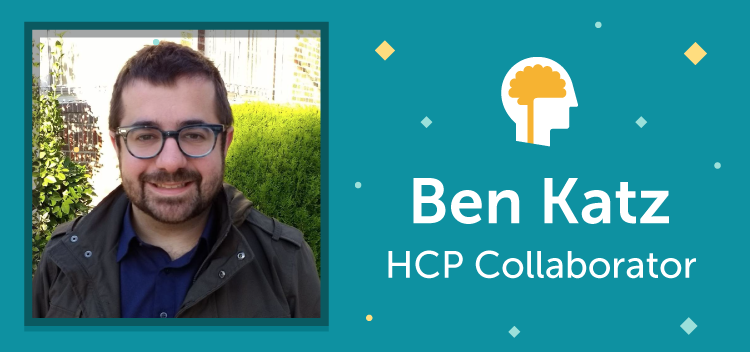
Meet Ben Katz: HCP Collaborator
Ben Katz is a doctoral candidate at the University of Michigan who uses Lumosity as part of his research. Prior to beginning the University of Michigan’s Combined Program in Education & Psychology (CPEP), Ben actually worked at Lumosity, first as a Game Designer and then as a Product Manager. His work at Lumosity gave him first-hand experience with our cognitive training platform and its potential uses in research, but he also had a lot of questions.
“I learned a lot during my time at Lumosity, and actually my experience working on the games, with the collaboration between the Research team and the Games team, inspired me to go back to school,” Ben explained. “I was very interested in questions about how and why and under what conditions cognitive training works for some people. At Michigan, I’ve tried to address these questions by focusing on individual differences, or how factors like age, socioeconomic status, and baseline ability affect a person’s cognitive training experience.”
Around the time Ben left Lumosity for Ann Arbor, we launched the Human Cognition Project (HCP). The HCP is a network of independent research collaborators studying a wide range of topics related to cognition. Through the HCP, these researchers are given free access to a number of Lumosity tools, depending on the specific needs of their study. These research tools include the Lumosity training program, our online assessments, and select, anonymized datasets.
At Michigan, Ben has had the chance to work on a number of research projects exploring cognition. For some of these projects, he has partnered with the HCP to use Lumosity tools in his analyses. Most recently, Ben worked with a Michigan alumni from his lab, Rebecca Rhodes, on “Working memory plasticity and aging,” which was published in Psychology and Aging in February 2017. In this study, Ben and Rebecca explored the effects of aging on learning a working memory task (working memory is used for temporarily storing and manipulating information). To do this, they analyzed Lumosity scores from 737 users who exclusively trained working memory with a version of the n-back task. The n-back task is a classic psychology task, which was initially conceived of as a pencil-and-paper task administered in laboratories and which inspired our game, Memory Match. In Memory Match, players see a sequence of shapes — triangles, squares, circles, and so on — and must recall if the new symbol matches the symbol two before it.
Ben and Rebecca were interested in understanding how individuals improved on the task as a function of age, education, and baseline working memory capacity. By accounting for these factors, Ben and Rebecca hoped their analysis would reveal the effects of aging specifically on how the participants seemed to learn and improve on the task over 20 training sessions. Upon analyzing the data, they found that age exerted independent effects on training gains...older adults tended to improve less and reached lower performance than younger adults. The difference between younger and older adults’ rate of learning depended in part on initial working memory capacity. These results suggest that age-related effects on working memory include not only effects on capacity, but also plasticity and the ability to improve on a task.
Presenting these findings to members of the Lumosity team, Ben explained, “Basically, the rate of improvement is slower for older adults, but we also observed that with enough sessions, older adults improved on the task to the baseline level of younger adults. I think this demonstrates that everyone can improve substantially on the task with enough practice. Of course, what remains to be seen is if and how improving on the task transfers to real life benefits.”
This study of working memory is just one of several studies Ben has worked on using Lumosity, and it won’t be the last. Our Director of Research, Bob Schafer, said, “We deeply admire Ben’s work to improve our understanding of how individual differences affect cognition. That’s not just because he was such a great friend and colleague — our company mission is increasingly focused on the importance of individual differences and personalized solutions. We founded the HCP really to help researchers conduct innovative, large-scale studies on a variety of topics, and so we always look forward to partnering with Ben because he always has a fresh approach to whatever he’s investigating.”
